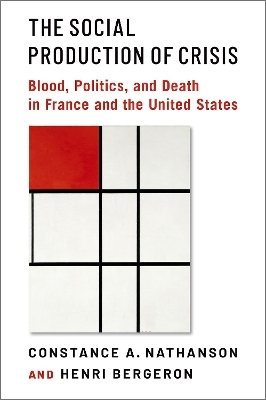
The Social Production of Crisis
Oxford University Press Inc (Verlag)
978-0-19-768248-7 (ISBN)
In The Social Production of Crisis, Constance A. Nathanson and Henri Bergeron focus on a profoundly troubling story to present a detailed case comparative analysis not only of the catastrophe itself and its multiple retrospective interpretations but also of its intimate connection to the history and organization of blood as a consumer product in each country. They draw on secondary sources, archival research, and interviews with key players to provide a historical, political, and social reconstruction of the HIV contamination of the blood supply to answer the question of how and why disease morphed into crisis in France and not in the United States. They also raise questions about the curious immunity to human suffering as a policy engine in the United States, about the often reiterated weakness of civil society in France, and about theorizing alternative epidemic trajectories.
Investigating a series of morally shocking events, this book develops a sociological theory of how political crises are socially produced and raises questions about disease policy and politics in the US and France.
Constance A. Nathanson is currently Professor Emerita at Columbia University. She has over 45 years of experience in research on sociological dimensions of health and health policy. Her work over the past 30 years has focused on the history, politics, and sociology of public health policy and policy change in the United States and in its peer developed countries. Recent publications include articles theorizing policy and policy change in public health from a sociological perspective, more substantive articles on tobacco and gun control policy, the role of social movements in policy change, and essays on health inequalities, as well as a book, Disease Prevention as Social Change (2007), that describes and interprets public health policy shifts across the past two centuries in the United States, France, Great Britain, and Canada. Henri Bergeron is a Senior CNRS Research Professor at the Center for Sociology of Organizations, Sciences Po, Director of the Chair "Transforming organization" at Sciences Po. He is also co-director of the Health Department of Interdisciplinary Centre for the Evaluation of Public Policies (Centre of Excellence - LABEX), and Scientific coordinator of the Chair in Health Studies-Sciences Po. He is the director of the Master on "Organizational behavior and Human Resources" at Sciences Po and the Scientific Director of the "Management and Public Affairs" track at Sciences Po's School of Public Affairs. He teaches and conducts research on organizational behavior, institutional changes and drivers (including digital transformation), on institutional entrepreneurship, and leadership, and on power in and between organizations (in particular in the field of health).
Preface
Chapter 1: Introduction
Chapter 2: The Social Life of Blood, 1948-1980
HIV/BLOOD STORIES
Chapter 3: Act I - Before the Storm, 1981-85
Chapter 4: Act II - The Storm Breaks, 1986-95
Chapter 5: Mobilization of the Afflicted
BLOOD EPISTEMOLOGY
Chapter 6: Litigation
Chapter 7: Compensation
Chapter 8: Authoritative Retrospection
REFLECTIONS
Chapter 9: The Social Production of Political Crisis
Chapter 10: Conclusion: Crisis and Change
APPENDICES
A. Chronologies
B. Acronyms
C. Sources
Bibliography
| Erscheinungsdatum | 11.03.2023 |
|---|---|
| Zusatzinfo | 1 b/w line drawing; 1 table |
| Verlagsort | New York |
| Sprache | englisch |
| Maße | 236 x 163 mm |
| Gewicht | 513 g |
| Themenwelt | Sozialwissenschaften ► Soziologie |
| ISBN-10 | 0-19-768248-0 / 0197682480 |
| ISBN-13 | 978-0-19-768248-7 / 9780197682487 |
| Zustand | Neuware |
| Informationen gemäß Produktsicherheitsverordnung (GPSR) | |
| Haben Sie eine Frage zum Produkt? |
aus dem Bereich


